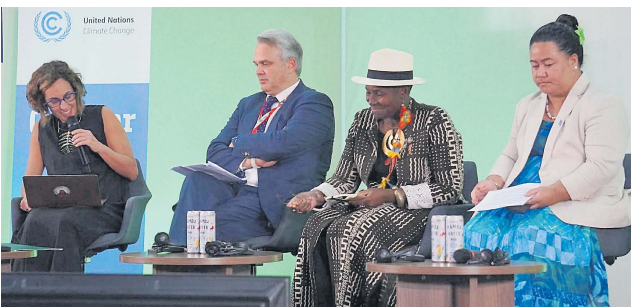THERE should be greater recognition of the leadership of women and girls, particularly those of African descent and Pacific communities on the front lines of climate change.
Speaking at the high-level COP30 platform event “Towards a people-centered climate action: recognising the role of women and girls of African descent,” Tuvalu’s attorney-general, Laingane Italeli Talia, shared the common struggles of vulnerable populations across regions and the urgent need to uphold gender equality and social inclusion as central pillars of international climate policy.
“I want to thank the COP30 Presidency and acknowledge the presence and leadership of Indigenous women, local communities, and youth,” Ms Talia said.
“I was really moved by the remarks of youth speakers earlier in the session, because young people play a critical role in climate negotiations and advocacy.
“If no one is to do it, we have to do it.”
Shared vulnerabilities across continents
Recognising the Amazon as ‘sacred lands’, Ms Talia drew parallels between its peoples and those in the Pacific, describing both as custodians of ecosystems essential to global climate stability.
Climate change, she said, is not a distant or abstract issue for her region.
“It is a deep reality that defines our present and threatens our very survival.”
She highlighted the uneven impacts of climate change, noting that women, girls, Indigenous peoples, persons with disabilities, rural communities and youth disproportionately bear its effects.
These impacts include heightened risks of gender-based violence, increased care burdens on women, and deteriorating sexual and reproductive health outcomes.
“It is obvious. Women and girls, indigenous peoples, youth, children, persons with disabilities and those in rural and maritime communities bear these personal impacts.
“In our region, the climate crisis exacerbates gender-based violence and has also been alluded to by my colleague, increases the care burden on women, and undermines sexual and reproductive health and rights.
“These intersections are further complicated by race, class, development, and, of course, geography, issues with both historical and ongoing consequences.”
In particular, she drew attention to the experience of women and girls of African descent, who face systemic racism, gender discrimination, under-representation in decision-making and socioeconomic exclusion.
Pacific progress and persistent challenges
Despite these challenges, Ms Talia said vulnerable communities are often the strongest drivers of change.
She pointed to Pacific regional frameworks, including the revitalised Pacific Leaders’ Gender Equality Declaration and the 2050 Strategy for the Blue Pacific Continent, as tools that reinforce the right of women and girls to lead in peace-building, security and governance.
According to Ms Talia, tangible progress is visible across the Pacific: higher rates of girls completing education, expanding economic opportunities for women, and improvements in reproductive and non-communicable health outcomes.
“Gender-responsive approaches in fisheries, ocean management, and disaster policy are strengthening sustainable resource stewardship.
“In Tuvalu specifically, the ocean shapes identity, culture and livelihoods.
She said women play a central role in local climate resilience efforts, from mangrove planting to coral restoration and sustainability advocacy.
“Women are not passive victims, but active guardians of our future.”
Climate change is a human rights issue
Framing the climate crisis as a matter of human rights, Ms Talia described its threat to Tuvaluans’ rights to life, food, water, health, and dignity.
She reiterated Tuvalu’s long-standing position that relocation is not a preferred solution.
“Our people want to remain on our ancestral lands.
“This is vital for cultural continuity and the protection of language and tradition.”
Ms Talia welcomed the recent advisory opinions of the International Court of Justice and the International Tribunal for the Law of the Sea, which affirm that states have binding, rather than merely moral, obligations to prevent climate harm and uphold the continuity of statehood for climate-vulnerable nations.
Call for ambition in global commitments
While acknowledging the constructive tone of ongoing COP30 negotiations, Ms Talia warned against any backsliding on previously agreed commitments.
In particular, she stressed the importance of strengthening, not weakening, the Gender Action Plan.
“Gender equality and climate action are inseparable.
“When women lead, disaster response and environmental stewardship become more inclusive, resilient, and effective.”
A vision for inclusive, sustainable future
Reaffirming the Pacific Small Island Developing States’ commitment to placing women and girls at the centre of climate action, Ms Talia called for increased global support for policies, investments, and partnerships that elevate their leadership.
“Supporting their leadership is not only a moral imperative. It is essential.
“And it should be framed as foundational to peaceful, inclusive, and sustainable futures for small and medium-sized states.”
Ms Talia concluded with a message of resilience and solidarity, emphasising the determination of Pacific women and girls and their communities, to protect their homes, oceans, and cultures.
“Together, we can forge a peaceful, gender-equal, inclusive, and sustainable world for our generations to come.”



